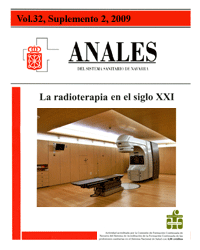Interaction of radiotherapy and new agents with molecular targets
DOI:
https://doi.org/10.23938/ASSN.0173Keywords:
Nuevas dianas moleculares. Interacciones con la radioterapia. Radiorresistencia. Radiosensibilidad.Abstract
Radiochemotherapy represents one of the greatest achievements in cancer treatment in recent decades, although it involves significant toxicity for patients. Research developed recently in the molecular biology of cancer has enabled understanding of the genetic and molecular changes that determine malign cellular transformation, which has led to the identification of key molecules, converting them into molecular targets that have led to a revolution in radiobiological concepts of cellular response to radiations and radioresistance. The new agents against molecular targets possess greater specificity and less adverse effects, making them more attractive than chemotherapy for combination with radiotherapy. They can act by inhibiting intracellular transduction signals, modulating the cellular cycle, apoptosis or inhibiting angiogenesis. The effect of radiotherapy can be strengthened through inhibition of cellular repopulation, improvement of tumour oxygenation, redistribution of the cellular cycle, inhibition of invasion and metastasis, and increase of radiosensitivity. The available data support its efficacy and applicability in preclinical and clinical studies in different tumour models and open up a promising path in cancer treatment.Downloads
Downloads
Published
How to Cite
Issue
Section
License
La revista Anales del Sistema Sanitario de Navarra es publicada por el Departamento de Salud del Gobierno de Navarra (España), quien conserva los derechos patrimoniales (copyright ) sobre el artículo publicado y favorece y permite la difusión del mismo bajo licencia Creative Commons Reconocimiento-CompartirIgual 4.0 Internacional (CC BY-SA 4.0). Esta licencia permite copiar, usar, difundir, transmitir y exponer públicamente el artículo, siempre que siempre que se cite la autoría y la publicación inicial en Anales del Sistema Sanitario de Navarra, y se distinga la existencia de esta licencia de uso.








